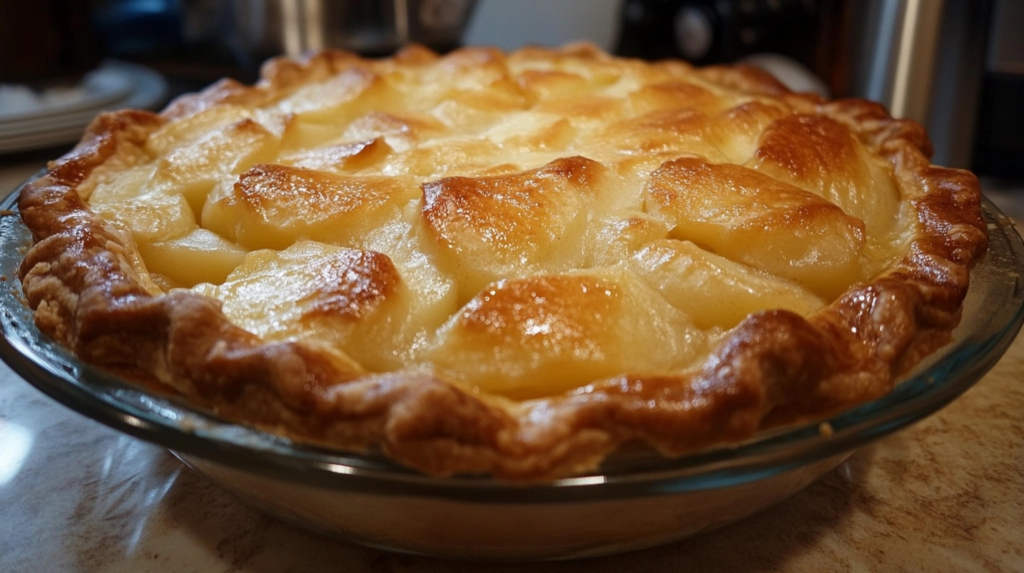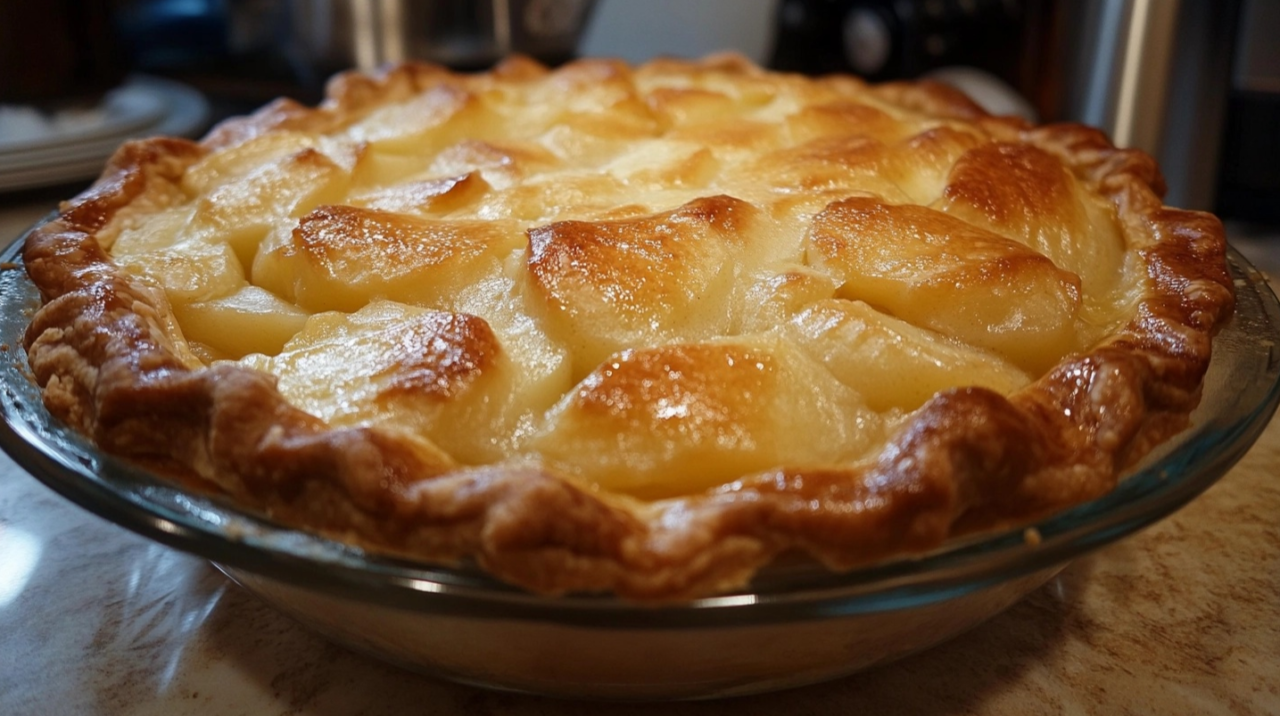What is Passover Potato Pie?
Passover potato pie is a beloved traditional dish served during the Passover holiday, blending simplicity with cultural heritage. This recipe uses humble ingredients like potatoes, eggs, and matzo meal to create a filling, comforting dish that complies with kosher dietary laws. Passover traditions prohibit leavened bread, and the passover potato pie serves as a perfect alternative to conventional dishes. Its versatility makes it ideal for accommodating various dietary preferences, including gluten-free and vegetarian options. Easy to prepare and deeply rooted in Jewish culinary traditions, this dish becomes a star attraction during family gatherings and celebrations. The enduring appeal of passover potato pie lies in its adaptability and the way it brings people together to celebrate both tradition and delicious food.

Why Choose Passover Potato Pie for Your Holiday Meal?
The passover potato pie offers a delightful combination of flavor and tradition, making it an essential addition to your Seder meal. Its hearty texture and savory taste are comforting, while its adaptability ensures that everyone at the table can enjoy it. Whether you’re seeking a gluten-free side dish or a vegetarian-friendly option, this pie checks all the boxes. Plus, its simple preparation process means you can focus more on spending time with loved ones and less on complicated cooking. Beyond its practicality, the dish embodies the essence of Passover—celebrating resilience, family, and togetherness. This pie not only satisfies dietary restrictions but also acts as a culinary symbol of shared experiences, making it a cherished part of the holiday.

Ingredients for the Perfect Passover Potato Pie
Creating a delicious passover potato pie starts with gathering the right ingredients. Here’s what you’ll need:
- Potatoes: Yukon Gold or Russet potatoes are ideal for their creamy and starchy qualities.
- Eggs: These act as the binder, holding the pie together.
- Matzo meal: A staple of Passover cuisine, it replaces breadcrumbs.
- Onions: Provides a subtle sweetness and depth of flavor.
- Seasonings: Kosher salt, black pepper, garlic powder, and paprika for added taste.
- Olive oil: Ensures a crispy crust and enhances flavor.
Optional ingredients include:
- Fresh herbs such as parsley, dill, or thyme for added freshness.
- Shredded vegetables like carrots, zucchini, or sweet potatoes for extra nutrition.
- Cheese (if permissible) for a creamy, indulgent variation.
Preparing Your Ingredients
The first step in making a perfect passover potato pie is to prepare your ingredients meticulously. Start by peeling and boiling the potatoes in salted water until fork-tender. While the potatoes are cooking, sauté finely chopped onions in olive oil over medium heat until caramelized. These onions add a rich, sweet undertone to the dish. Once the potatoes are ready, drain them thoroughly and mash them until smooth. Combine the mashed potatoes with beaten eggs, matzo meal, sautéed onions, and your chosen seasonings in a large mixing bowl. Mix until everything is evenly blended and the mixture reaches a cohesive consistency. Taking care with this step ensures the final pie has the perfect texture and balance of flavors.
Step-by-Step Instructions for Assembling the Passover Potato Pie
- Preheat your oven to 375°F (190°C).
- Generously grease a baking dish with olive oil to prevent sticking.
- Evenly spread the potato mixture in the dish, smoothing the top with a spatula for an even finish.
- Drizzle additional olive oil over the surface to promote a golden, crispy crust.
- Bake in the preheated oven for 45-50 minutes, checking periodically to ensure it doesn’t overcook.
- For an extra-crispy top, broil the pie for the last 2-3 minutes.
- Allow the pie to cool slightly before slicing and serving. Cooling the pie helps it set, making it easier to slice and ensuring that each piece retains its shape.
Tips for Perfecting Your Passover Potato Pie
- Opt for starchy potatoes like Russet for a creamier texture.
- Caramelize onions slowly to enhance their sweetness.
- Add a pinch of paprika to the top before baking for a burst of color and flavor.
- Avoid overmixing the potato mixture to prevent a dense texture.
- Ensure the baking dish is well-greased to make serving easier and to achieve a beautifully crisp crust.
Variations to Try with Passover Potato Pie
One of the best features of passover potato pie is its adaptability. Here are some creative variations to try:
- Vegetable-Loaded Version: Incorporate shredded zucchini, carrots, or spinach for a boost of nutrients and color.
- Cheesy Twist: Add shredded cheese for a dairy-rich variation that pairs beautifully with matzo ball soup.
- Herb-Infused: Mix in fresh herbs like dill, rosemary, or thyme to elevate the flavor profile.
- Vegan Option: Substitute eggs with a flaxseed and water mixture for a plant-based version.
- Spiced Variation: Add a dash of cumin or chili powder for a Middle Eastern-inspired twist. These variations can cater to different tastes and dietary requirements, making the dish even more versatile.
The Ultimate Banana Bread Cake with Cream Cheese Frosting
Serving Suggestions for Passover Potato Pie
Pair your passover potato pie with complementary dishes to create a well-rounded Passover feast:
- Start with matzo ball soup to warm the palate.
- Serve a fresh green salad with vinaigrette to balance the richness of the pie.
- Accompany with roasted root vegetables like carrots, parsnips, and beets for a colorful plate.
- Offer a side of charoset for a sweet, symbolic addition to the meal.
- Include a selection of pickled vegetables to add tanginess and variety to the table. These pairings enhance the flavors of the pie and create a cohesive meal.
How to Store and Reheat Passover Potato Pie
Leftovers are almost as good as the freshly baked pie if stored properly. Here’s how:
- Refrigeration: Store the pie in an airtight container in the refrigerator for up to three days.
- Reheating in the Oven: Preheat your oven to 350°F (175°C), cover the pie with aluminum foil to retain moisture, and heat for 15-20 minutes.
- Freezing: Wrap the pie tightly in plastic wrap and foil before freezing. It can be stored for up to one month.
To reheat a frozen passover potato pie, bake it directly from frozen at 375°F (190°C) until heated through. Proper storage and reheating techniques ensure that the dish maintains its texture and flavor even after several days.
Common Mistakes to Avoid When Making Passover Potato Pie
- Overmixing the Mixture: Overworking the potatoes can result in a dense, gummy texture.
- Skipping the Oil: Properly greasing the baking dish ensures the pie doesn’t stick and facilitates a crispy crust.
- Using the Wrong Potatoes: Stick to starchy varieties like Russet for the best results.
- Neglecting Seasoning: Potatoes absorb flavors well, so don’t skimp on salt, pepper, and other spices.
- Not Allowing the Pie to Cool: Letting the pie rest before slicing prevents it from falling apart.
Nutritional Benefits of Passover Potato Pie
The passover potato pie is not only delicious but also nutritious. Here’s why:
- Potatoes: A good source of potassium, vitamin C, and dietary fiber.
- Eggs: Provide high-quality protein and essential nutrients like vitamin D and choline.
- Onions: Contain antioxidants and compounds that promote heart health.
- Matzo Meal: Adds texture and provides a source of carbohydrates for energy.
For a lighter version, consider reducing the olive oil and substituting sweet potatoes to lower the glycemic index while adding natural sweetness. These small adjustments can make the dish healthier without sacrificing flavor.
Why Passover Potato Pie Deserves a Place at Your Table
With its rich flavors, comforting texture, and symbolic significance, the passover potato pie is more than just a dish—it’s a celebration of heritage. Easy to prepare and endlessly versatile, it embodies the spirit of Passover by bringing family and friends together. Whether you stick to the classic recipe or experiment with creative variations, this dish is guaranteed to impress and delight. Its adaptability ensures it will remain a cherished part of Passover celebrations for generations to come.
FAQs
1. Can Jews Eat Potatoes During Passover?
Yes, potatoes are allowed during Passover. Potatoes are considered kosher for Passover because they are naturally free of chametz (leavened products), which are prohibited during the holiday. Whether you choose to enjoy roasted potatoes, mashed potatoes, or potato-based dishes like kugel, potatoes are a versatile and popular ingredient for Passover meals. It’s important to make sure they are prepared in a kosher kitchen, using only kosher-for-Passover ingredients to avoid contamination with non-Passover foods. Potatoes are a staple in many families’ Passover meals due to their simplicity and versatility.
2. Can You Eat Kugel on Passover?
Kugel is a beloved dish in Jewish cuisine, but whether you can eat it during Passover depends on the ingredients used. Traditional kugel recipes typically contain noodles or flour, both of which are not allowed during Passover because they contain chametz. However, there are many kosher-for-Passover kugel recipes that substitute matzah meal, potato, or other kosher Passover ingredients instead of flour and noodles. Popular options include potato kugel and matzah kugel, which adhere to Passover dietary laws. If you’re preparing kugel for Passover, always make sure the ingredients are certified kosher for Passover to ensure it meets the holiday’s requirements.
3. Is Potato Starch Kosher for Passover?
Yes, potato starch is kosher for Passover and is a popular substitute for flour during the holiday. Potato starch is naturally gluten-free and does not contain chametz, making it an ideal ingredient for Passover recipes. It is commonly used in making dishes like matzah ball soup, potato kugel, and potato pancakes, as well as a thickening agent for sauces and soups. When purchasing potato starch for Passover, ensure that it is certified kosher for Passover to avoid any chance of contamination with non-Passover ingredients. Potato starch is a great pantry staple for those following kosher dietary laws during the holiday.
4. Are Potato Pancakes Kosher for Passover?
Potato pancakes, or latkes, are a classic dish enjoyed during Passover, especially during Hanukkah. However, the traditional recipe that uses flour or breadcrumbs as a binding agent is not allowed on Passover. Instead, you can make kosher-for-Passover potato pancakes by substituting regular flour with matzah meal or potato starch. These ingredients help keep the pancakes kosher while preserving their texture and flavor. When making latkes for Passover, make sure the oil used for frying is kosher for Passover, and avoid any utensils or cooking surfaces that may have come into contact with chametz. By using the right substitutes, potato pancakes can be a delicious and kosher addition to your Passover meal.


1 thought on “Passover Potato Pie Recipe: A Perfect Dish for Your Seder Table”